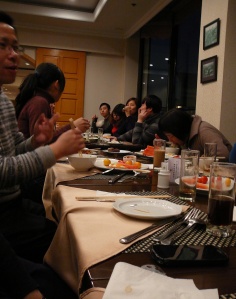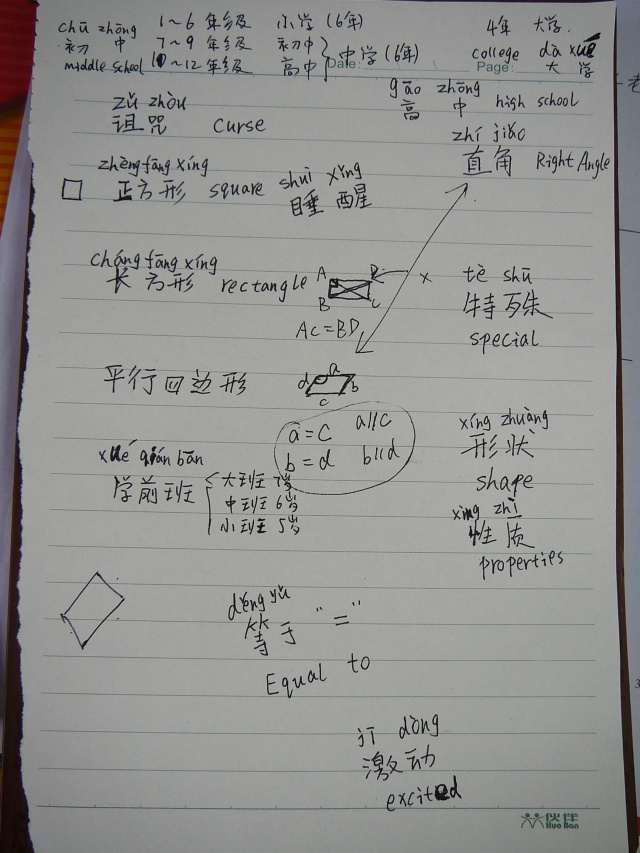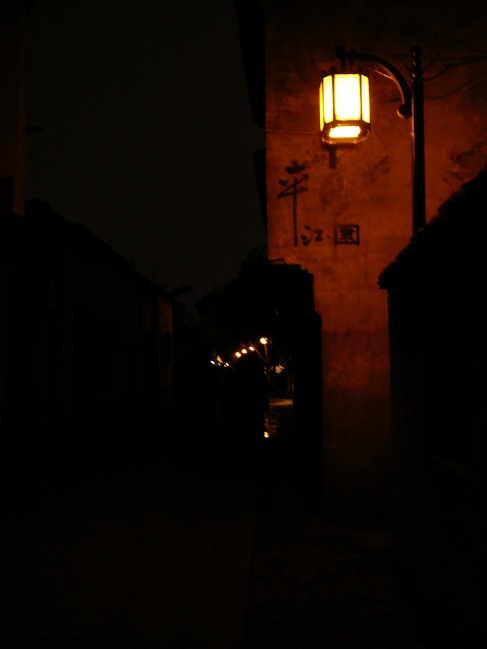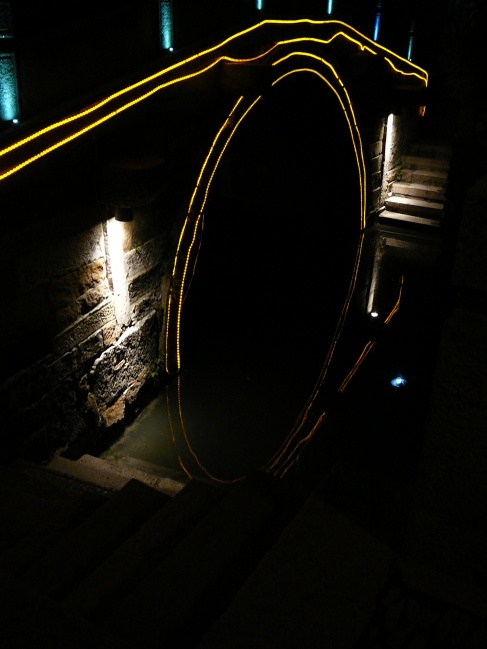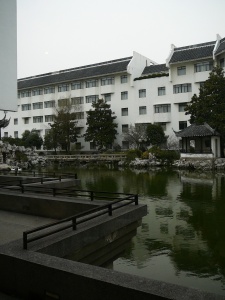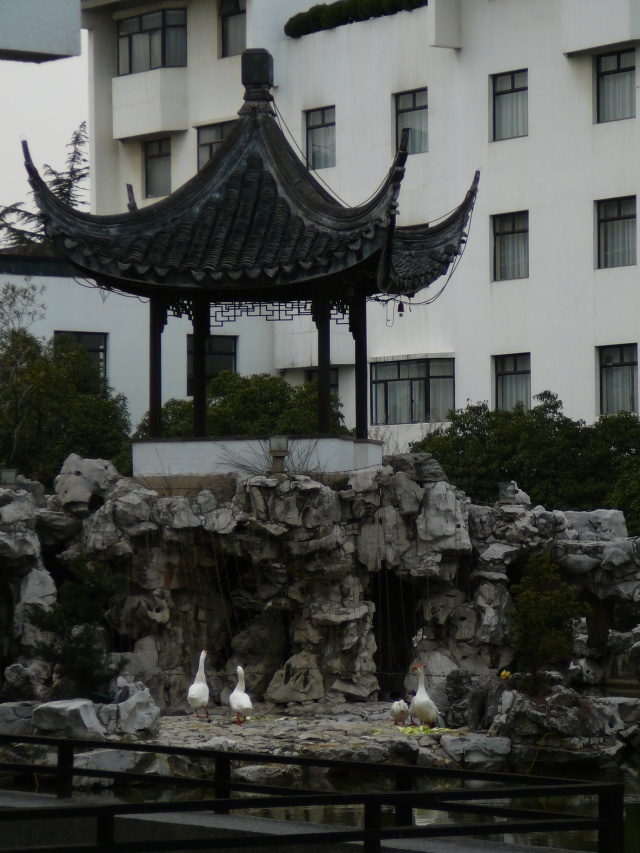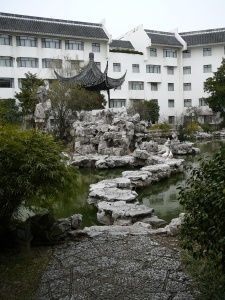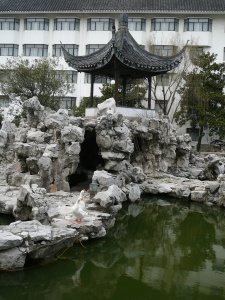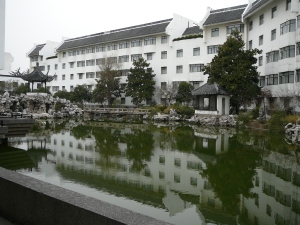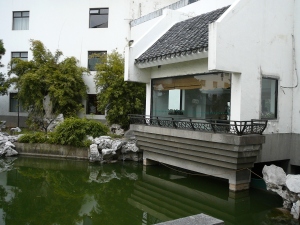“Tomorrow is International Women’s Day,” Wang老师 informed me on Wednesday.
“Oh! I said, “I’m an international woman!”
(I was pleased when this ‘joke’ got repeated in Chinese at dinner later)
She laughed and asked, “How are you going to celebrate?” I shrugged. “I don’t know, I haven’t even gotten around to thinking about tomorrow!”
I didn’t even know there /was/ an International Women’s Day coming.
三八妇女节 – san1ba3fu4nü3 – Three Eight Women’s Holiday. The 3 refers to March, and the 8 refers to the date, representing the calendar date of IWD. I don’t recall celebrating such a thing in the States, and after noticing others talking about it more, I got the impression that it was kind of a big deal, especially when Wang老师 told me that all the faculty was going out to dinner together on Friday night to celebrate.
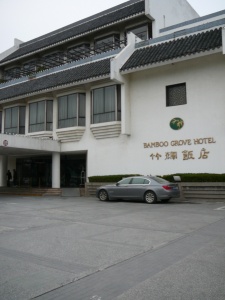
Suzhou's first 4-star hotel - the gate and walls are designed like bamboo
We went to the Bamboo Grove Hotel restaurant. The Bamboo Grove restaurant was established in 1989, and was Suzhou’s first 4-star hotel. The wall/fence around the place is designed like bamboo. Hotel restaurants seem to be ‘the place’ to go if you want a fancy dinner in China.
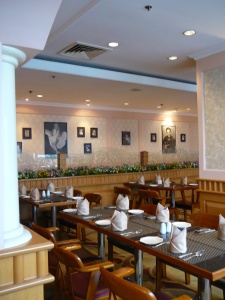
The international interior - yes! That is Marilyn Monroe and Elvis on the wall!
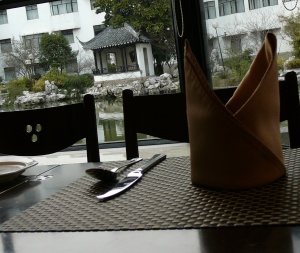
a courtyard with a pagoda, just beyond my silverware!
“你的三八妇女节怎么过?” I asked Wang老师 at the Friday dinner, referring to the previous day (Thursday). How did you celebrate Women’s Day?
All holidays are the same! she replied, Eat food, go shopping!. When I’d asked Ms. Xu, she’d laughed that although many stores have Women’s Day sales, she was unable to take advantage of them because she had night duty at the school. What about Taobao? I had asked, referring to the most popular online shopping (like Amazon) site. Yes, they had a few sales, but not on anything Ms. Xu wanted!
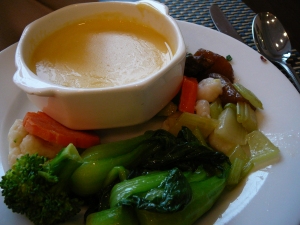
first plate - cream of pumpkin soup (eh) and some good vegetables
Wang老师 explained that many women with small children will spend some time doing something fun with their kid. “But not me,” she said, “Richard has papers to write this weekend, and a big test coming.” Her very tall son Richard is in his last year of middle school, and is trying very hard to be ready for the 中考 at the end of this school year since he wants to go to a 1st-tier high school — the same school that all the other bright kids are gunning for. Many people have heard of the 高考 Gao1Kao3 – the high school graduation test that determines peoples’ college options and future in general. The 中考 is a similar test to determine acceptance into High School. After reading Outliers by Malcolm Gladwell, I am wondering if the distribution of students’ birthdays at good schools is shifted towards the late fall… “He has to fight for every point. Every point matters!” she emphasized.
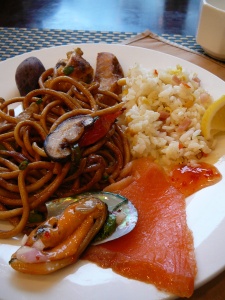
Chinese "chow mein", fried rice, sushistuff, mussel with onions?verygood, chicken and a beet in the back.
Mostly, Women’s Day seems to be a day when Women can relax a bit and do something they enjoy, most often shopping, visiting with friends, going out for dinner, or spending some time with kids who have time. I decided to spend my Women’s Day on Friday morning, baking bread which everyone referred to as cake, but that should probably be its own post.
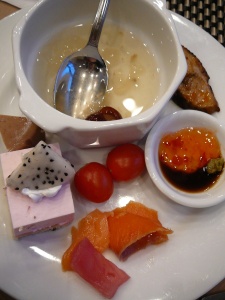
dessert plate, including a mystery soup
“Is there a Men’s Day?” I asked at the dinner. The principal was sitting next to her. He is hilarious in a very casual sort of way that often includes subtleties of Chinese linguistics (he is a Chinese teacher), and they got into a discussion about which days might count as Men’s Day – coming up with perhaps Fathers Day and Singles Day (11/11), or perhaps it should be August 3rd (8/3) since Women’s Day was March 8th (3/8).
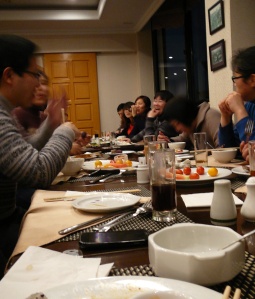
Principle Zhan has the whole table in stitches
In answer to whether there was a Men’s Day: “No,” said Wang老师, “So we should thank them for celebrating with us! We need them!”
I think if I asked the same question in the States, I would get the response that, ‘every day is Men’s Day!’ so, that’s the response that I was half expecting, and almost ready to supply myself, but I like Wang老师’s answer better!
